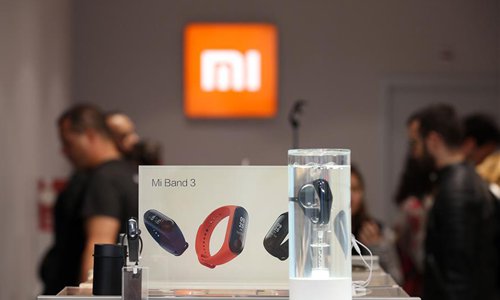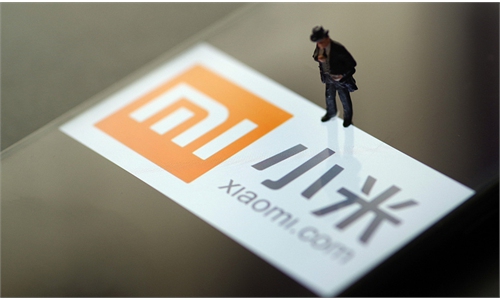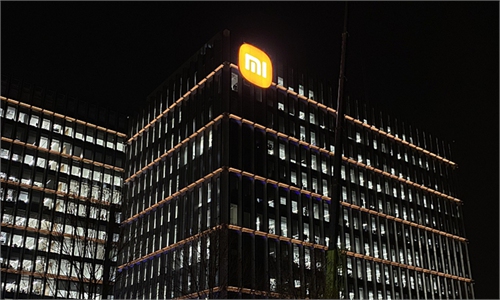
Xiaomi products are seen at a newly-opened Mi store in Porto, Portugal, on June 15, 2019. File Photo: Xinhua
Production of Electric Vehicles (EVs), which are already popular in China and growing steadily in the US and Europe, has just ushered in a new player, the Chinese smartphone vendor Xiaomi. The move is not surprising at the moment as domestic firms are running to jump on the bandwagon of the inexorable EV trend with competition only getting tougher.
Lei Jun, founder, chairman and CEO of Xiaomi, stated during the 2021 launch event on Tuesday that its smart EV business will be operated under a wholly-owned subsidiary by Xiaomi with an initial investment of 10 billion yuan ($1.5 billion).
The phone manufacturer is committed to invest an estimated $10 billion in total in the next 10 years.
According to Lei, Xiaomi is at its prime and has set a foundation to break new ground to start building its Smart EV business. He added that he has done a detailed research on the area through consultation with over 200 industry experts, and internal management members of the board.
It seems a little bit late for Xiaomi to make such a move, since various firms have already explored in the Smart EV sector, including Tesla, which started production localization in Shanghai over two years ago, the Chinese trio of Nio, XPeng and Li Auto, and internet giants like Baidu, which has recently announced its EV plans with automaker Geely. However, opportunities still abound, analysts told the Global Times on Wednesday.
"The industry fever has just started, and we call 2020 the first year of the global market-oriented development of new energy vehicles," said Jack Yu, chief editor of Auto Business Review and co-founder of Autosquare Vehicle app.
If there were doubts about investing in the EV industry, the year of 2020 was surely a boost in confidence and determination to continue the growing trend in the sector, Yu told the Global Times.
Tesla's sales in China more than doubled last year amid the COVID-19 pandemic. Its sales of $6.66 billion accounted for about 21 percent of the $31.54 billion in total revenue.
Tesla's shares surged last year and its market cap surpassed the traditional auto behemoth Toyota for the first time in the middle of 2020. Local rising trio of Nio, XPeng and Li Auto have all witnessed stellar performances last year.
Yu said that, for newcomers like Xiaomi, it is not late because making EVs is like running a marathon which needs patience, stamina and strength. It is based on disruptive technologies of connected intelligence and autonomous driving rather than the decades of experience of making traditional internal combustion cars.
Yu said more players are likely to announce their plans to officially enter the EV sector this year.
Having a bright outlook for the new enterprise, Xiaomi said it has "the deepest understanding of the hardware-based internet service business model, experience in software and hardware integration, and the most profound manufacturing know-how within the internet industry."
It also features a smart ecosystem which is the largest in terms of scale, the most diversified in terms of product category, and the most active in terms of user connections.
The number of connected IoT devices (excluding smartphones and laptops) on Xiaomi's IoT platform reached 324.8 million units, representing a year-over-year increase of 38 percent.
Shi Yan, analyst from Ways Information Technology, a Guangzhou auto industry consultant agency, told the Global Times that "Xiaomi is just naturally dancing with the trend." Consumers have been cultivated to some extent by the EV products over past few years and several rounds of industry reshuffle have helped the emerging sector to become more market oriented and with more transparent competition.
However, pressure and challenges cannot be easily ignored like the fierce competition in the sector and the continuous investment it requires.
Making cars is much more complicated than making smartphones and the supply chain of the former is also longer, Citigroup said in a report in February. Moreover, car manufacturing is an asset heavy business model, which consumes a lot of resources. There are long-term financial burdens to the company that may have an impact on its current profitability.
Founded 18 years ago, Tesla became profitable for the first time in 2020. According to a report by PingAn Securities, the US giant's investment over the period from 2010 to 2019 exceeded 200 billion yuan ($30 billion).
Although no details have been unveiled on Xiaomi's EV manufacturing, analysts believed that the firm is unlikely to set an original equipment manufacturer agreement (OEM) or joint venture (JV) with a local manufacturer as it claims its business is wholly proprietary.
Domestic automaker, Great Wall Motors, denied last week that it is currently in talks with Xiaomi to manufacture EVs, following Reuters report that Xiaomi planned to use their facilities to make EVs.



